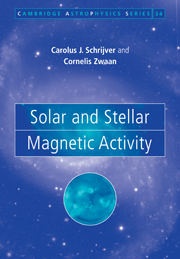Book contents
- Frontmatter
- Contents
- Preface
- 1 Introduction: solar features and terminology
- 2 Stellar structure
- 3 Solar differential rotation and meridional flow
- 4 Solar magnetic structure
- 5 Solar magnetic configurations
- 6 Global properties of the solar magnetic field
- 7 The solar dynamo
- 8 The solar outer atmosphere
- 9 Stellar outer atmospheres
- 10 Mechanisms of atmospheric heating
- 11 Activity and stellar properties
- 12 Stellar magnetic phenomena
- 13 Activity and rotation on evolutionary time scales
- 14 Activity in binary stars
- 15 Propositions on stellar dynamos
- Appendix I Unit conversions
- Bibliography
- Index
4 - Solar magnetic structure
Published online by Cambridge University Press: 14 August 2009
- Frontmatter
- Contents
- Preface
- 1 Introduction: solar features and terminology
- 2 Stellar structure
- 3 Solar differential rotation and meridional flow
- 4 Solar magnetic structure
- 5 Solar magnetic configurations
- 6 Global properties of the solar magnetic field
- 7 The solar dynamo
- 8 The solar outer atmosphere
- 9 Stellar outer atmospheres
- 10 Mechanisms of atmospheric heating
- 11 Activity and stellar properties
- 12 Stellar magnetic phenomena
- 13 Activity and rotation on evolutionary time scales
- 14 Activity in binary stars
- 15 Propositions on stellar dynamos
- Appendix I Unit conversions
- Bibliography
- Index
Summary
The magnetic field that corresponds to conspicuous features in the solar atmosphere is found to be confined to relatively small magnetic concentrations of high field strength in the photosphere. Between such concentrations, the magnetic field is very much weaker. The strong-field concentrations are found at the edges of convective cells: convective flows and magnetic field tend to exclude each other. These time-dependent patterns indicate that the magnetic structure observed in the solar atmosphere is shaped by the interplay between magnetic field, convection, and large-scale flows.
The construction of a comprehensive model for the main phenomena of solar magnetic activity from basic physical principles is beyond our reach. The complex, nonlinear interaction between turbulent convection and magnetic field calls for a numerical analysis, but to bring out the main observed features would require simulations of the entire convection zone and its boundary layers. The intricacy of convective and magnetic features indicates that extremely fine grids in space and in time would be required. Such an ambitious program is far beyond the power of present supercomputers. Hence, we must gain insight into the solar magnetic structure and activity first by studying the observational features, and subsequently by trying to interpret and model these with the theoretical and numerical means at hand.
Our approach is to map the domain of solar magnetic activity by a mosaic of models. Some of these models are well contained; others are based on ad hoc assumptions.
- Type
- Chapter
- Information
- Solar and Stellar Magnetic Activity , pp. 82 - 113Publisher: Cambridge University PressPrint publication year: 2000

